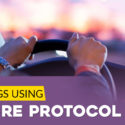Teddy Panos: We’re back here at 980 WCAP Merrimack Valley Radio. Teddy Panos, Chris Poublon. We’re not breaking any laws this morning. I do want to bring in our next guest, however. You heard that theme song. It wasn’t a coincidence that a member of our expert network attorney Mike Bowser is joining us in studio. We don’t encourage you breaking the law but if you do, well, you’re going to need a good lawyer. You might as well call our favorite lawyer. How are you, counselor?
Mike Bowser: I’m doing great. Good morning.
Teddy: Good morning. Good to have you here. How are things?
Mike: Busy.
Teddy: Busy is good. You do more than just — when we bring you in we talk an awful lot about your specialty, which is driving and operating under the influence cases and laws. That’s what we’re here to talk about today. You do handle other cases as well through the law firm?
Mike: Oh yes. We do a lot of criminal defense work. I actually have a drug case today over in the old District Court to a lot of other criminal work and a lot of personal injury litigation both in Mass and New Hampshire.
Breath Test Consolidated Decision
Teddy: Okay. The last couple of times we’ve talked to you, the discussions have been dominated by the problems that you help disclose on our air a year or so ago about the breathalyzer test. How the machine wasn’t calibrating properly or wasn’t properly being calibrated. Who knows what the case may be in many of those cases?
It put at risk, what you said were, hundreds of cases involving folks who had been pulled over for operating under the influence and had been subjected to those breathalyzer tests. You told us that there was going to be a very important ruling coming at some point that would determine the future of these cases and maybe of that machine. The jury reached a verdict.
Mike: Well, not the jury but–
Teddy: [laughs] The judge.
Mike: There was a consolidated group. Originally it started off with about 560 cases from across the commonwealth. The purpose of that consolidated group was we were allowed by the Supreme Court decision to challenge the scientific reliability of the Dräger Alcotest 9510. That’s the particular machine utilized in Massachusetts for breath testing.
As that case went forward for about two years other cases involving breath test evidence were essentially stayed or backed up and placed on pause waiting for the same decision. It got probably close to 3,000 cases across the state. The decision from Judge Robert Brennan who was the judge assigned to conduct the one hearing and write the one decision came down February 16th.
The gist of it is we were challenging the reliability of the software. He found that the software, although not perfect, was scientifically reliable. He found that the machine is able to distinguish alcohol from other interfering substances in the way that it uses its methodology. The science behind the machine, the technology is reliable.
What he did find is that Office of Alcohol Testing — that’s the state agency that was responsible for maintaining, calibrating and then certifying these machines annually; this is about 350 machines or so across the state — prior to September of 2014, they did not have in place any written protocols or procedures as to how they went about calibrating, certifying the machines annually.
If you were to walk into their laboratory prior to that date they would have said “Well, we do it the way we do it. It’s a word of mouth procedure.” Which in a laboratory that’s not scientifically reliable.
Teddy: I was just going to say in a court of law where facts matter and evidence matters, that’s not a good way to conduct business.
Breath Tests Excluded As Evidence
Mike: It was not. He found that that was wholly lacking on the part of the Office of Alcohol Testing. Actually the most important part of the decision going backwards was he ended up saying that or deciding, ordering, that any test done prior to September of 2014 is presumably excluded. The Commonwealth can try to get around that order by bringing in the scientists that actually did the calibration for a particular machine.
That would mean they would have to bring in a scientist for every single breath test prior to that date. His decision, his order, ended up excluding hundreds and hundreds of breath tests, many of which have been waiting for that decision.
Then, interesting enough, through the process — there’s about 10 days of testimony, there were eight to 10 witnesses that testified for both the state and for the defense — we learned a whole lot about the machine. The machine has about a seven percent margin of error. OAT admits that on any given test there is about a seven percent margin of error.
Teddy: That’s high. Well if you’re a .10, .09, .08 that’s certainly high.
Breath Temperature
Mike: Then another thing that came out as a scientist from Dräger testified that within their own corporate studies. They found that breath temperature drifts about six degrees up and down. The machine is set up and it assumes that every person that blows into the device their breath temperature is 34 degrees Celsius. That’s based on a study of six Swedish guys in 1954.
I mean those numbers have been around forever. When they did their own studies, they found that people’s breath temperature goes anywhere from 37 as a high down to 31 as a low. The significance of that is if you’re one degree Celsius high your breath result is elevated six and a half percent. If you’re three degrees over that, then it could be as much as 20% off the wrong way.
The technology exists by way of a thermostat to measure breath temperature and correct for it. Which is how they do it in Europe. It’s how they do it in Alabama. That’s not how they do it in Mass. There is no thermostat in Massachusetts.
If you’re running a fever, you’re just one or two degrees over 34 degrees Celsius, and plus the 7% drift, you can have a significant margin of error. Significantly false positive high breath test. That’s some of the stuff that came out of this hearing process.
Teddy: Who knew the variances? Who knew the potential flaws with this? When did they know it?
Other Breath Test Issues
Mike: Well there are other issues. The machine is supposed to have — it has a fuel cell measuring device and an infrared measuring device. Those to talk to each other. They’re supposed to have a tolerance between the two because if there’s a drift between those two measuring devices, it would indicate an interfering substance is present.
Massachusetts requires 38 micrograms per liter to be the maximum tolerance allowed. Every single machine sent by Dräger into Massachusetts is set up at 60 micrograms per liter, nearly twice. Not a single machine online in Massachusetts is actually set up to the tolerances that OAT requires. We found that out as well. That’s maybe a basis for exclusion going forward if the government can’t show that these devices are actually set up correctly. We came to find out that they’re not.
Teddy: Now again, this is not meant to say, that’s obviously not meant to encourage operating under the influence, drinking and driving. It’s not meant to say that when you are pulled over because you have been swerving, because you hit a parked car or a moving car that you’re not under the influence. Obviously, that’s something serious and needs to be dealt with. You can tell when someone is really drunk.
What we’re talking about here, however, is that we thought we had a scientific method to determine that. When they start — the blood alcohol level used to be higher before and then it got dropped to .08. A lot of that was based on that we had science that determined who was under the influence, who wasn’t, at what level.
We’ve also have been under the impression for decades now that we could measure it dispassionately. We’re not talking about the observations of an officer. We’re not talking about what he saw, what the suspect did. We’re talking about pure, hard and fast science. We’re not, are we?
Mike: We’re not.
Teddy: We are talking about a machine that is very, very flawed and really can’t tell you the truth to the specific degree. Where as you said if you are .23 you are a .2, we get it. If you’re .09 or .10 or if you blew .08, .09, .10.
Mike: These are criminal prosecutions. This is a courtroom where it is proof beyond a reasonable doubt.
Teddy: Loss of licence.
Mike: Proof to a moral certainty is the standard of proof. Before this hearing process, I think many jurors would come to believe that that machine is perfect, it’s magic. And it’s not.
D0es This Decision Dismiss all Drunk Driving Charges?
What is also important to realize is that the decision doesn’t dismiss all of these drunk driving charges. It just says these cases are going forward. These people are all going to be prosecuted and go to trial if they choose to do so. They’re just going to go to trial without the breath test evidence. They’re still going to be facing OUI charge with observations, field sobriety tests, how they were driving, how they were acting.
In these particular cases that one piece of evidence has been removed from the equation. The judge — you can tell throughout this decision, which I thought was pretty well done — he understands the importance of these test results. They can have the effect of basically a guaranteed conviction, in many cases, because that number is over that .08 threshold. If a jury is taking that to be a perfect machine — a reliable machine — it is very difficult to overcome that evidence.
The End of the Breathalyzer?
Teddy: Is this the beginning of the end of the breathalyzer machine as we know it? Is it the beginning of getting a better machine? A better way of determining if somebody is under the influence especially when they’re borderline?
Mike: I think what came out of this decision is that the machine works as it’s designed to. It’s not a bad machine. There were some definite issues with the way that it was put into the field. How it was calibrated. How it was certified so that a defense practitioner wanting to challenge the history of the machine, the validity of the machine, would be at a loss to do so just because of the way that it was put online. Things have improved. They’ve improved as a result of this litigation. They’ve improved as a result of changes that have been made at OAT. I mean, that’s our job. We push back and hopefully things get better for our clients and better for everybody overall.
Teddy: Do you have clients that are affected by this decision of February 16th? Now, I know with confidentiality you can’t give me too much, but–
Mike: No, out of the original 560, I think I had 35. So now I’m going to be trying three OUI cases a week for the next six months.
Teddy: Is your winning percentage about to go up? You batting average is going to improve, right? You’re going to be like Big Papi when he came from the Twins to the Red Socks?
[laughter]
Mike: I’m going to be going for that short right field fence.
[laughter]
Mike: No, I’m happy to have cases now going to juries without breath test evidence, certainly. Those cases are, I think, easier to overcome without the breath test evidence. My job is that much easier for those particular cases. Then, on the cases where my tests weren’t excluded, I’ve got more work to do. I’ve found out quite a bit about the machine that I’m going to use going forward.
Teddy: We always like to say, we certainly don’t encourage you to require attorney Bowser’s services. Don’t drink and drive. Don’t take any drugs and drive and you won’t be in need of them. What we know, human nature is human nature. Somebody you know — maybe you, one of these days — is going to be in need of his services. How do we get ahold of you, counselor?
Mike: My website is bowserlaw.com. You can go through the website and get me 24/7. The phone number is 1-888-5-Bowser.
Teddy: How can you not like this guy? He comes in here, puts up with me on a monthly basis. I’m trying to put him out of business. I’m trying to tell people, “Don’t do it.” It’s going to put him out of business.
Mike: Yes. I figure I have about 10 years left before self-driving vehicles. That’ll be right about the time that I can retire, maybe.
Teddy: I was going to say, technology might change and make all this moot anyway, won’t it?
Mike: Sure. That’s why I have the other parts of my practice.
Teddy: All right. One more time, how do folks get in touch with you, counselor?
Mike: It’s bowserlaw.com and 1-888-5-Bowser.




